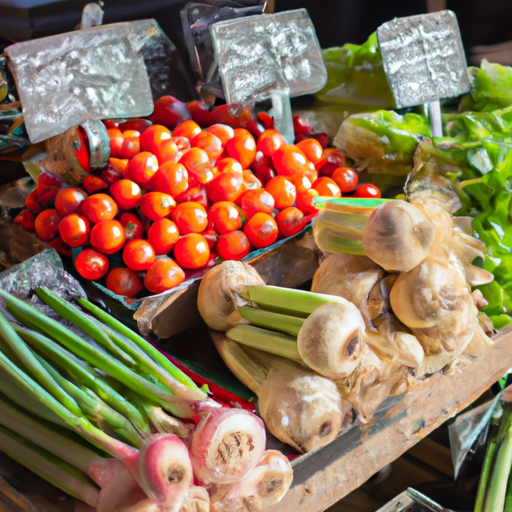Are you considering a vegan diet, but worried about missing out on essential nutrients? You’re not alone. Many people mistakenly believe that following a vegan lifestyle means compromising nutrition and health – but this isn’t true! A balanced vegan diet can provide all the nourishment your body needs without any animal products whatsoever.
- Benefits Of A Balanced Vegan Diet
- Nutritional Needs Of A Balanced Vegan Diet
- Sources Of Protein In A Balanced Vegan Diet
- Sources Of Healthy Fats In A Balanced Vegan Diet
- Types Of Carbohydrates In A Balanced Vegan Diet
- Menu Ideas For A Balanced Vegan Diet
- [Final Thoughts] What Does A Balanced Vegan Diet Look Like?
In this article, we’ll examine what exactly a balanced vegan diet looks like. We’ll go over which foods supply vital vitamins, minerals, and macronutrients for optimal wellbeing.
Plus, I will address one of the most common objections: That vegans don’t have enough variety in their diets to stay healthy in the long run.
Rest assured – it is entirely possible to enjoy an array of delicious meals while still reaping the benefits of a plant-based lifestyle!
At its core, living as a vegan is about joining together with others who are also passionate about creating positive change within society and our environment.
By understanding how to craft a nutritious meal plan that doesn’t require animal byproducts or compromise taste, you can take part in this movement while feeling confident that your dietary choices are making a lasting impact on both personal and global levels.
So let’s get started exploring what “balanced” truly looks like when eating as a vegan!
Benefits Of A Balanced Vegan Diet
A balanced vegan diet can be incredibly nutritious and healthy for those who choose to follow it.
Gone are the days when plant-based diets consisted mainly of grains and legumes. Nowadays, vegans pay close attention to what they eat, ensuring that their meals include all the essential nutrients without any animal products involved.
As a result, many people opt for a balanced vegan diet with plenty of fruits, vegetables, nuts, seeds, whole grains, and legumes – not only providing adequate nutrition but also helping reduce their risk of developing certain diseases such as heart disease or type 2 diabetes.
These nutrient-rich foods give energy while keeping our bodies functioning properly.
They provide fiber which helps keep us full throughout eating occasions; vitamins like B12 help boost moods; minerals like iron support red blood cell production; omega 3 fatty acids benefit brain health; antioxidants safeguard against cellular damage caused by free radicals…the list goes on!
Additionally, there’s no need to worry about missing out on important proteins either: quinoa is one example of a complete protein source suitable for vegans.
With these components combined together into a well-rounded meal plan each week (or better still month!), you should find yourself feeling energized both physically and mentally.
Are you considering adopting a plant-based lifestyle? Gain valuable insights and inspiration by checking out our compelling article on The Advantages of a Vegan Diet.
Nutritional Needs Of A Balanced Vegan Diet
For those wanting to adopt a balanced vegan diet, there’s no doubt that it can be difficult to determine what the nutritional needs are.
It’s often assumed that because meat is eliminated from the diet, essential nutrients won’t be obtainable.
But this isn’t true.
In fact, research has revealed that vegans may even have an increased intake of certain vitamins and minerals due to their greater awareness of dietary sources for these essentials.
The key to any balanced diet is understanding what nutrition your body requires in order to function optimally—and for vegans, this means focusing on plant-based protein sources.
These come mainly from legumes such as beans, lentils, and peas; grains like quinoa and oats; nuts & seeds; and vegetables like broccoli, spinach, and mushrooms.
To simplify your vegan journey and make it more enjoyable, follow the essential tips to maintain a vegan lifestyle and diet on our blog.
Additionally, many cereals and plant milks are fortified with calcium and vitamin B12.
By obtaining these important vitamins and minerals through food sources rather than supplements (where possible), you’re sure to achieve lasting health benefits while still enjoying all the delicious flavors a vegan lifestyle has to offer.
Knowing where to get adequate amounts of each nutrient within your chosen dietary parameters can seem daunting at first.
Luckily there are plenty of resources available online which provide comprehensive breakdowns of macronutrients and micronutrients associated with various vegan meals.
With proper planning and dedication to meal prep, you’ll soon find yourself equipped with all the knowledge necessary for curating a balanced vegan diet which caters perfectly to your individual nutritional needs.
Discover the essential information on foods to avoid as a vegan and navigate the challenges of maintaining a vegan diet successfully.
Sources Of Protein In A Balanced Vegan Diet
A balanced vegan diet is like a work of art, focused on providing all essential nutrients to the body while using only plant-based sources. When it comes to protein, having enough of this macronutrient in our diets is key for maintaining strong muscles and bones.
Fortunately, vegans have an abundance of options when it comes to getting enough protein into their daily meals. Edamame beans, lentils, tofu, tempeh and seitan are just some great sources of complete proteins that can be easily incorporated into breakfast, lunch, or dinner recipes.
Other non-animal based sources such as nuts, seeds, and legumes provide incomplete proteins but with careful planning may still help meet your protein needs.
In addition to these foods being tasty and versatile ingredients in any meal plan, they also offer other health benefits that come from the vitamins and minerals they contain – making them great additions to anyone’s vegan diet looking for variety as well as balance!
From here we move onto exploring healthy fats which play an equally vital role in keeping us nourished without compromising on flavor or texture.
Sources Of Healthy Fats In A Balanced Vegan Diet
A balanced vegan diet is like a beautiful puzzle, the pieces of which must be carefully placed to achieve their full potential. Fats are essential for this dietary masterpiece, providing energy and helping absorb certain vitamins.
Finding healthy fats in a vegan diet can seem tricky at first glance but with some knowledge, you’ll see that there’s an abundance of delicious options available.
Plant-based fats such as nuts, seeds, avocados and olives are all excellent sources of monounsaturated and polyunsaturated fatty acids.
These types of fat have been linked to many health benefits including improved heart and brain health.
Peanut butter, tahini (sesame seed paste) and nut butters provide great flavor while also offering plenty of healthy fats. Plant oils like extra virgin olive oil, coconut oil or avocado oil can add richness to dishes when used as part of cooking or added after preparation.
But it’s not just plant sources that offer up tasty fats. Nutritional yeast delivers savory umami flavors along with vitamin B12, making it popular among vegans looking for cheese-like flavors without the dairy products – plus it contains significant amounts of beneficial fatty acids too!
Healthy doses of omega 3 fatty acids can be found in foods like chia seeds and flaxseeds which often get sprinkled on top salads or blended into smoothies for an additional boost.
With these abundant sources available one should never feel deprived of getting enough healthy fats in their vegan diet.
The next piece to complete our nutritious vegan picture is carbohydrates…
Types Of Carbohydrates In A Balanced Vegan Diet
Carbohydrates are an essential part of any balanced vegan diet. In fact, according to The Academy of Nutrition and Dietetics, 45-65% of your daily calories should come from carbohydrates.
It’s important for vegans to ensure they’re getting their carbs from healthy sources such as whole grains, fruits, vegetables, nuts, seeds, beans and legumes.
Whole grain options like quinoa and brown rice are excellent sources of dietary fiber that provide a steady source of energy throughout the day without causing spikes in blood sugar levels.
Fruits and vegetables contain natural sugars which can be enjoyed in moderation; look out for antioxidant-rich dark leafy greens or brightly colored berries! Nuts, seeds, beans and legumes also supply valuable plant-based proteins along with slow digesting carbohydrates – think hummus made from chickpeas or roasted almonds with fresh strawberries.
Every meal should have some type of carbohydrate included to meet our body’s needs.
Finding delicious ways to incorporate these foods into our routine is essential for maintaining both physical and mental health on a vegan lifestyle.
Eating a variety of nutrient dense foods will help us reach optimal wellbeing. With this knowledge about carbohydrates in mind, let’s now explore the many essential vitamins and minerals found in a balanced vegan diet.
Menu Ideas For A Balanced Vegan Diet
Are you curious about what a balanced vegan diet looks like? You’re not alone! Eating vegan can be an incredibly nourishing and satisfying way to eat, but it also requires mindful planning. In this section, we’ll explore some delicious menu ideas for creating a balanced vegan diet that covers all your nutritional needs.
First of all, start by making sure your plate is packed with plenty of colorful fruits and vegetables. These provide essential vitamins and minerals and should form the foundation of each meal. Aim for at least two servings of fruit and four servings of veggies per day.
Additionally, include whole grains such as quinoa, oats or brown rice into meals in order to get adequate dietary fiber. Legumes are excellent sources of plant-based proteins too; think black beans, lentils or chickpeas – these can be added to salads, stir fries or curry dishes.
Nuts and seeds are fantastic side snacks because they have healthy fats needed for good nutrition as well as being tasty additions to any dish!
Next comes adding some dairy alternatives if desired – soy milk is a popular choice among vegans for its calcium content.
Other non-dairy milks such as almond milk or coconut milk can also offer great flavor options when poured over cereal or used in smoothies. Lastly don’t forget Omega 3 fatty acids which help reduce inflammation – chia seeds, flaxseeds or walnuts contain lots of these beneficial nutrient compounds so consider throwing them into salads or baking them into muffins!
Now that you know how to assemble nutritious vegan meals full of color and texture, let’s move on to discussing tips for maintaining a balanced vegan diet going forward…
[Final Thoughts] What Does A Balanced Vegan Diet Look Like?
In conclusion, a balanced vegan diet is an excellent way to improve overall health and wellbeing. Research has found that vegans tend to have lower rates of obesity, heart disease, and Type 2 diabetes than those on other diets. With proper planning and knowledge about the nutritional requirements for a healthy lifestyle, anyone can enjoy the benefits of eating a plant-based diet.
It’s important to remember that variety is key when it comes to getting all the essential vitamins and minerals from food sources. Eating plenty of whole grains, legumes, nuts, fruits and vegetables will ensure you’re meeting your body’s needs while also enjoying delicious meals. Additionally, consuming some fortified foods or supplements may be beneficial in order to get enough vitamin B12 which cannot be obtained through a Vegan diet alone.
Finally, take time each week to plan out nutritious meals so you don’t end up reaching for unhealthy snacks or processed foods full of empty calories. By staying mindful of what goes into your body as well as incorporating movement such as walking or light exercise into your daily routine, maintaining a balanced vegan diet is achievable for everyone.

